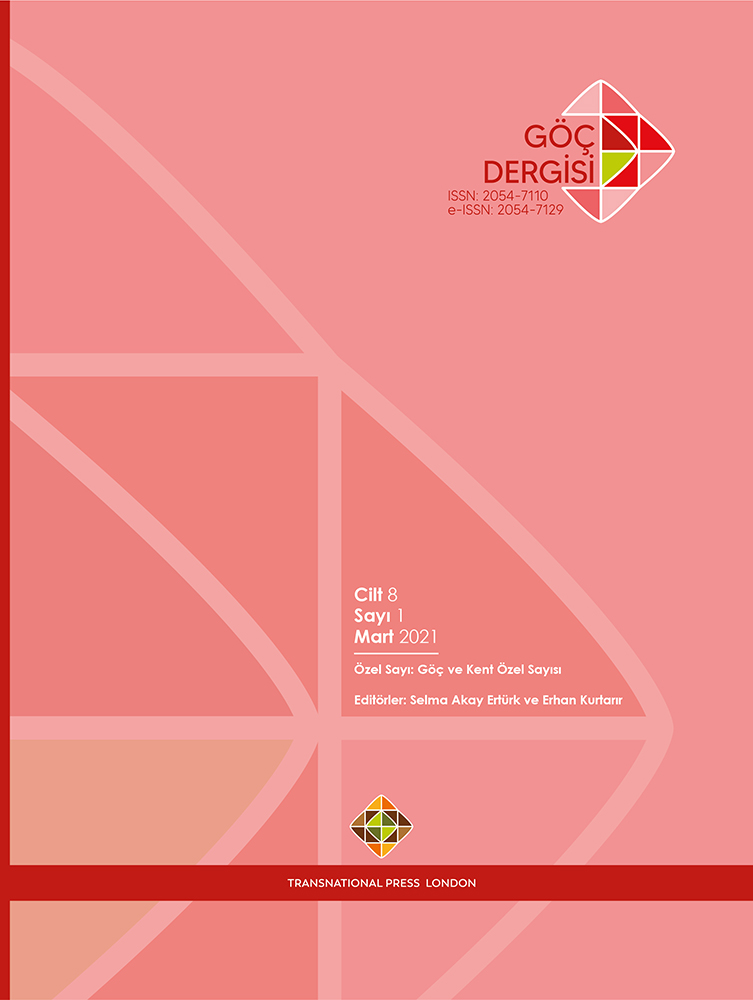Suriyeli Mültecilere Karşı Kabullenici ve Reddedici Kültürleşme Stratejilerinin Belirleyicileri: Hatay Örneği
DOI:
https://doi.org/10.33182/gd.v8i1.722Anahtar Kelimeler:
Kültürleşme, Tehdit algısı, Ulusal özdeşleşme, Etnik özdeşleşme, Suriyeli MültecilerÖzet
Birden fazla grubun teması sonucunda gerçekleşen kültürel ve psikolojik değişimleri ifade eden kültürleşme, hem ev sahibi hem de göçmen grupları ilgilendiren bir süreçtir (Berry, 2005). Ev sahibi topluluğun belirli bir göçmen grup için benimsediği ve göçmenler tarafından belirli bir ev sahibi grup içinde benimsenen kültürleşme stratejileriyse kültürleşmenin anahtar kavramlarındandır (Bourhis ve diğerleri, 1997). Bu stratejiler, ev sahibi topluluklar açısından göçmen grupla uyumlu şekilde birlikte yaşamaya yönelik ilişkileri kabullenici ya da reddedici yönde seyredebilmektedir. Bu çalışmada Hatay’da yaşayan Arap ve Alevi kimliğe mensup yerli topluluğun, Suriyeli mültecilerle ilgili kültürleşme yönelimleri, tehdit algısı ve kendi gruplarıyla özdeşleşme değişkenleri çerçevesinde incelenmektedir. Bu amaçla 252 katılımcıyla bir anket çalışması yürütülmüştür. Hatay’da yaşayan yerli halkın etnik, dini/mezhepsel ve ulusal kimliklerle özdeşleşmesinin bağımsız; kabullenici ve reddedici kültürleşme stratejilerini benimsemenin bağımlı ve algılanan tehdidin aracı değişken olarak ele alındığı altı farklı model analiz edilmiştir. Bulgular, iç gruplarla özdeşleşmenin kültürleşme yönelimlerini hem doğrudan hem de tehdit algısı aracılığıyla yordadığını göstermektedir.
ABSTRACT IN ENGLISH
Determinants of Welcoming and Rejecting Acculturation Strategies Against Syrian Refugees: Hatay Sample
Acculturation referring to cultural and psychological changes that occur as a result of contact between two or more social groups is a process including both the host and the immigrant groups (Berry, 2005). Acculturation strategies adopted by the host community for a particular group and adopted by immigrants within a receiving society are key concepts of acculturation (Bourhis et al., 1997). These strategies, with regards to host groups, can be welcoming or rejecting to living in harmony with immigrants. The aim of this study is to explore the acculturation orientations of Turkish host society living in Hatay, who are from Arab ethnic origin and Alevi religious section, toward Syrian refugees. For this aim, a survey study was carried out with 252 participants. Six different models were analyzed in which identification with national, ethnic and religious/denominational identities were considered as independent variables, welcoming or rejecting acculturation strategies as dependent variables, and threat perception as mediator variable. Results showed that in-group identification predicts acculturation strategies both directly and through threat perception. Findings are discussed in the light of the literature.







